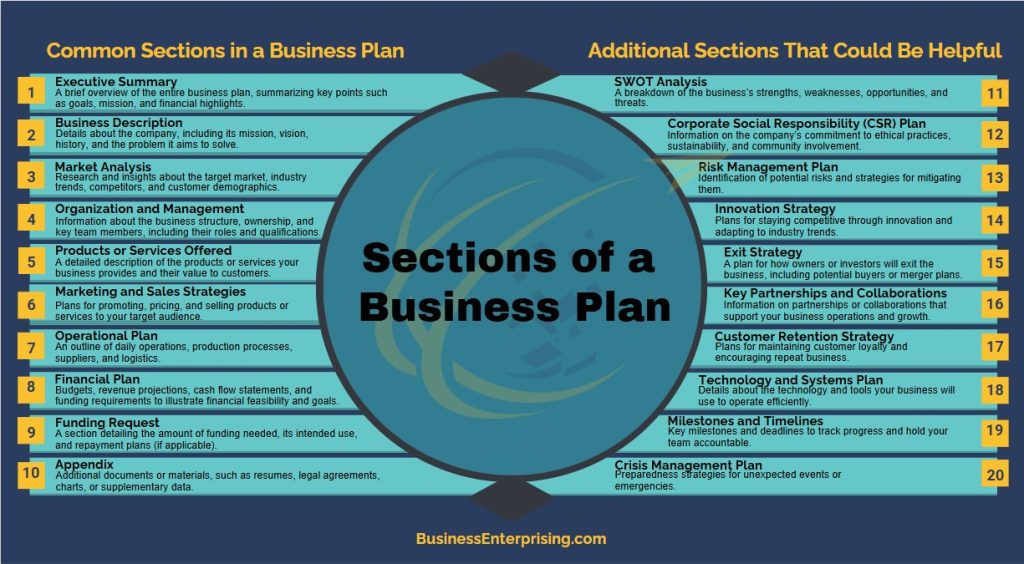
However, a business plan is more than just a document; it’s a tool for communication. Whether you’re presenting your ideas to potential investors or aligning your team, a clear plan builds confidence and credibility. Additionally, it ensures that your strategies and actions stay focused on your long-term vision.
By addressing all the key elements of your business, you set a strong foundation for growth. From market research to financial planning, creating a business plan allows you to organize your ideas and prioritize your efforts. This process not only supports your goals but also prepares you to seize new opportunities.
Defining Your Business Vision and Mission
Defining your business vision and mission is a foundational step when creating a business plan. Your vision explains the long-term impact you want your business to have. It provides a clear direction and inspires you and your team to work toward shared goals. Additionally, a well-defined mission outlines the purpose of your business and the value it offers to customers. Together, these elements create a strong sense of identity for your business.
When clarifying your vision, think about what you want to achieve and how your business will stand out. For example, consider the problem you aim to solve and the change you want to create. A clear vision will guide your decisions and help you stay focused on the bigger picture. However, your mission statement focuses more on your present goals and the specific actions you’ll take to fulfill them. It should reflect your commitment to delivering value and building trust with your audience.
Additionally, your vision and mission serve as tools for communication. Sharing these statements with employees, partners, and customers builds alignment and fosters collaboration. They help others understand what you stand for and why your business matters. When creating a business plan, your vision and mission ensure that every element aligns with your overarching goals, from marketing strategies to operational decisions.
By investing time in defining these core elements, you set a strong foundation for your business. A clear vision motivates you to achieve long-term success, while your mission keeps you grounded in delivering consistent value. These guiding principles will not only shape your strategy but also inspire confidence in your brand.
Conducting Market Research and Identifying Your Target Audience
Conducting market research is a critical step when creating a business plan. Understanding your market helps you identify trends, competition, and customer needs. By analyzing this information, you can make informed decisions and tailor your strategies to fit market demands. Additionally, thorough research provides insights that help you avoid costly mistakes and seize new opportunities.
To begin, focus on your target audience. Consider who your ideal customers are and what problems they face. For example, analyze their demographics, preferences, and purchasing behaviors. This data allows you to understand how your products or services can meet their needs effectively. However, it’s also important to assess competitors in your industry. By studying their strengths and weaknesses, you can position your business more effectively.
Additionally, gathering feedback directly from your audience can refine your approach. Surveys, interviews, and focus groups provide valuable insights into customer expectations and preferences. These methods allow you to test ideas and adjust your offerings before fully committing. When creating a business plan, this research ensures that your strategies align with real-world demand.
Understanding your market and audience not only shapes your business model but also strengthens your brand. By knowing your customers, you can deliver solutions that resonate with them and build loyalty. This targeted approach sets you apart from competitors and paves the way for sustained success.
Developing a Comprehensive Financial Plan
Developing a comprehensive financial plan is a key step when creating a business plan. A strong financial plan helps you manage resources, project future needs, and set realistic goals. By budgeting carefully, you can allocate funds effectively and control expenses. Additionally, forecasting revenue and costs gives you a clearer picture of your business’s potential growth.
When creating your budget, consider both fixed and variable expenses. This approach allows you to identify areas where you can save or adjust spending. However, it’s also important to forecast revenue based on market research and customer demand. Accurate forecasting helps you anticipate cash flow and make informed decisions about scaling your business.
Funding strategies are another essential part of your financial plan. Whether you’re seeking loans, investors, or grants, clearly outline how you will use the funds. Additionally, preparing detailed financial statements, such as profit and loss projections, can build confidence with potential investors. These documents demonstrate your commitment to transparency and financial stability.
A well-crafted financial plan not only supports your business operations but also positions you for long-term success. By understanding your numbers, you can adapt to challenges and seize new opportunities with confidence. Integrating this financial framework into your business plan ensures a solid foundation for growth and sustainability.
Outlining Your Marketing and Sales Strategies
Outlining your marketing and sales strategies is essential when creating a business plan. These strategies define how you will reach and retain customers. A well-structured plan ensures that your efforts align with your business goals and resonate with your target audience. Additionally, effective strategies help you build a loyal customer base and generate consistent revenue.
When planning your marketing approach, consider multiple channels to connect with your audience. For instance, digital platforms like social media and email campaigns offer cost-effective ways to engage customers. However, traditional methods such as print advertising or local events may also be effective, depending on your market. Tailoring your message to customer preferences ensures better results and stronger relationships.
Your sales strategy should focus on converting leads into loyal customers. Consider how your pricing, promotions, and sales processes will influence buying decisions. Additionally, investing in customer relationship management (CRM) tools can streamline interactions and track key performance metrics. By analyzing this data, you can refine your approach and identify opportunities for growth.
A comprehensive marketing and sales plan positions your business for long-term success. By understanding your audience and leveraging the right tools, you can build meaningful connections and drive growth. Integrating these strategies into your business plan provides a clear roadmap for achieving your goals and staying competitive.
Creating an Operational Plan for Daily Activities
Creating an operational plan is a key step in structuring your business processes and logistics. This plan outlines how your daily activities align with your broader goals. By detailing workflows, resource allocation, and schedules, you create a clear path to efficiency. Additionally, an operational plan ensures consistency and helps you manage your team effectively.
When developing your plan, focus on key processes that drive your business. For example, consider how you will manage inventory, handle customer orders, or schedule deliveries. However, it’s also important to identify potential bottlenecks or inefficiencies. Addressing these challenges early can save time and improve overall performance.
Technology can play a critical role in operational planning. Tools like project management software or automated scheduling systems help you track tasks and streamline workflows. Additionally, creating contingency plans for unexpected issues, such as supply chain disruptions, ensures that your operations remain resilient. These steps contribute to a stronger foundation for your business.
Integrating your operational plan into your overall business strategy is essential when creating a business plan. A well-structured approach not only supports your goals but also positions your company for growth. By organizing your daily activities effectively, you can improve productivity and provide consistent value to your customers.
Setting Measurable Goals and Performance Metrics
Setting measurable goals and performance metrics is essential when creating a business plan. Clear goals give you a roadmap for achieving success. By establishing benchmarks, you can monitor progress and identify areas for improvement. Additionally, measurable goals help you stay focused and prioritize your efforts effectively.
When setting goals, focus on specific and achievable objectives. For example, aim to increase sales by a certain percentage within a set timeframe. However, it’s also important to align your goals with your overall business strategy. This alignment ensures that every effort contributes to your broader mission.
Tracking performance metrics allows you to evaluate whether your strategies are working. Metrics such as revenue growth, customer retention, or operational efficiency provide insights into your progress. Additionally, reviewing these metrics regularly helps you adapt to changes and stay on track. Tools like dashboards or analytics software can simplify this process and provide real-time updates.
By incorporating measurable goals and performance metrics, you create a strong foundation for growth. These benchmarks allow you to celebrate achievements and address challenges proactively. As part of your planning, they provide clarity and confidence, helping you build a more resilient and successful business.
Conclusion
Creating a business plan is a valuable step in building a successful business. It helps you clarify goals, organize processes, and track progress. Additionally, a well-crafted plan provides a clear roadmap for decision-making and growth. By addressing all key aspects, you create a comprehensive guide for achieving your objectives.
However, flexibility is also important. As your business evolves, you may need to update your plan to reflect new challenges and opportunities. Regularly reviewing and refining your strategies keeps you aligned with your goals. This adaptability ensures that your business plan remains relevant and actionable.
In conclusion, creating a business plan is about more than just organization; it sets the foundation for long-term success. By staying focused, measuring progress, and adjusting as needed, you can build a resilient and thriving business. Your commitment to thoughtful planning will position you to achieve sustainable growth and reach your business goals.



